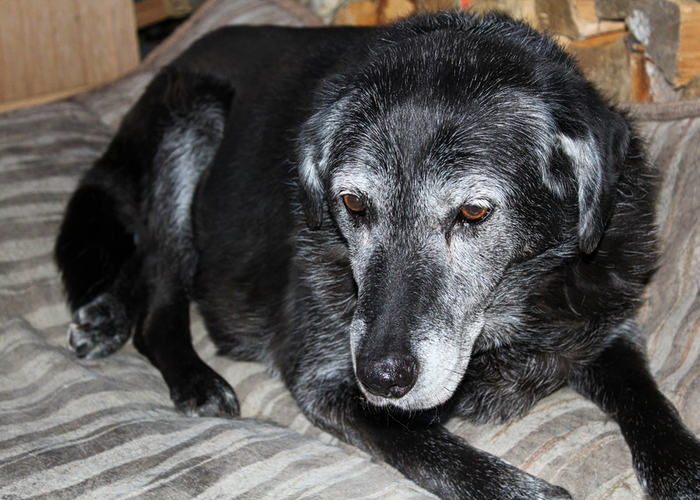Table of Contents
- What is Cognitive Dysfunction Syndrome?
- Forms of Canine Cognitive Dysfunction
- Symptoms of Cognitive Dysfunction Syndrome
- Causes of Cognitive Dysfunction Syndrome
- CDS in Dogs Diagnosis
- Dog Dementia Treatment
- Cognitive or Behavioral Enrichment
- Making your Home Safer
- Canine Cognitive Dysfunction Prevention
- CDS Prognosis
- Vet Checkups for dogs with CDS
- Frequently Asked Questions
Have you ever heard of Cognitive Dysfunction Syndrome? No? How about Canine Cognitive Dysfunction? Still no? Or maybe Dog Dementia. Well, they are the same thing!
Cognitive Dysfunction Syndrome or CDS in dogs is a disorder connected to the aging of the dog's brain. Canine dementia can lead to changes in their awareness, learning, and most of all, their memory.
The symptoms of this disorder are somewhat mild, but they can get worse over time. This is called “cognitive decline”. Cognitive decline is not normal but it can increase with advanced age.
Clinical research says that one out of three dogs over the age of 11 is prone to have CDS. By the age of 16 and above, almost all dogs experience at least one symptom of this disorder.
So is this disorder treatable? What are the symptoms? Before we answer all these questions, let's discuss, what is Cognitive Dysfunction Syndrome or Dog Dementia?
What is Cognitive Dysfunction Syndrome?
Cognitive Dysfunction Syndrome or CDS is the dog equivalent of Alzheimer's disease in humans. In time, the dog's brain will slowly degenerate, leading to abnormal and senile behaviors that will decline cognitive functions.
Canine dementia is most common in old dogs, generally on dogs that are 9 years old and above. When a dog has CDS, there is a toxic substance called “beta-amyloid protein” that accumulates in the brain.
Two other changes that occur when a dog is experiencing CDS are reduced blood flow and dysfunctional neurons. These neurons are the cells that carry information throughout the body and to the brain.
In addition, Alzheimer's disease affects about 10% of people with the age over 65 and 50% of people over 85. But in CDS, about 14% of dogs 8 years old and above are affected by this disease.

Forms of Canine Cognitive Dysfunction
Involutive Depression
This kind of depression occurs in their late years and is similar to chronic depression in humans. As their anxiety worsens, so does their depression.
A few symptoms of this are circling, wandering around, and improper defecation or urination around the house.
Dysthymia
This form is when a senior dog loses feelings and appears to lose coordination. Monitor your dog and if you find them getting “stuck” behind furniture or corners.
This includes loss of body length and size. Other symptoms include constant growling, whining, wake/sleep cycle, and aggression. When a dog is in this stage, they are easily triggered and tend to bite without them knowing.
Hyper-aggression
This may be sad to hear, but this is the part where canine dementia can cause pet-human bonds to break and can sometimes lead to euthanasia.
The deficiency of serotonin, makes it harder for the dog to communicate. It is also harder for them to receive messages and will impulsively bite even the owner.
In addition, in this type of aggression, there can also be brain tumors involved.
Confusional syndrome
This form is where a dog suffers from a major decline in cognitive abilities. It is similar to Alzheimer's disease in humans.
In this stage, the dog will not be able to or will have a very hard time learning. They will forget familiar features like other family members or in severe cases even their owner.

Symptoms of Cognitive Dysfunction Syndrome
In determining the signs of CDS, Dr. Brian Gray Barnett says that dog owners can use the acronym DISHAAL which stands for:
- Disorientation – Includes getting trapped in corners or furniture and occasionally zoning out or staring blankly at walls.
- Interactions – Abnormal interactions with familiar people like family members or other pets. It can be seen as aggression or a change in social interaction.
- Sleep-Wake Cycle Changes – It can be an increase in sleeping throughout the day or difficulty sleeping at night.
- House Soiling – Includes urinating and defecating in unusual areas.
- Activity Changes – With an increase in resting, comes a decrease in physical activities such as pacing, walking, running around.
- Learning Difficulties – Learning difficulties and memory loss is the most common side effect and it can be seen if a dog is having a difficult time performing learned tricks or tasks.
Other signs can include:
- Anxiety
- Restlessness
- Confusion
- Wandering
- Pacing at night
- Excessive barking at night
- Lack of self-grooming
- Loss of appetite
- Less interaction with their owners
Causes of Cognitive Dysfunction Syndrome
The exact cause of CDS or Canine Dementia is still unknown. But it is commonly caused by the physical and chemical changes that occur with the dog's aging process.
As our dog's age, their brain loses neurons, meaning that the cells die. This impacts brain functions causing dog dementia.
On the other hand, age-related cognitive decline is not the only cause of dementia in dogs. Brain tumors, brain trauma, and even genetic factors are included in determining CDS.
CDS in Dogs Diagnosis
On determining the diagnosis, you'll need to give a full history of your pup's health to the vet. This includes the nature of the symptoms and other possible incidents that could've triggered the unusual behaviors or problems.
After that, your vet will conduct a complete physical exam to evaluate the dog's overall health and cognitive functions.
In addition, they will also perform ultrasounds, x-rays, and routine blood tests to check on other possible health issues that can lead to CDS.
Dog Dementia Treatment
When comes to dog dementia treatment, it requires lifelong therapy and support. But you can still help your dog when it comes to improving their cognitive functions.
This will not technically cure your dog, but it can help maintain their health and can help slow the progression of cognitive decline.
Since there is no cure for dog cognitive dysfunction syndrome, here's a quick list of treatments that can slow the progress of the disease:
Cognitive or Behavioral Enrichment
Through cognitive enrichment, you can improve your dog's brain function. Applying daily routine of exercise, social interactions, playtime, and re-training the tricks and commands that they've forgotten.
In addition, you can also teach them new commands to learn and provide new toys to play with.
A few examples of brain games for dogs that have CDS are playing dog puzzles and playing hide and seek but with delicious treats of course!
Dietary Supplements
Clinical research has proven that dietary supplements like an antioxidant-enriched diet can improve an older dog's learning capability. But not only that, but it can also reduce the symptoms of cognitive dysfunction syndrome.
Some of the supplementations include:
- Vitamin A
- Vitamin E
- L-Carnitine
- Alpha-lipoic acid
- Antioxidants from fruits and vegetables
Dietary changes
Dogs that are suffering from Canine Cognitive Dysfunction Syndrome can benefit from a therapeutic diet. This specific diet must contain ingredients such as antioxidants, fatty acids, and fats that can protect and maintain healthy brain cells.
On top of that, you can also switch to dog foods that are specially formulated to support brain health.
Making your Home Safer
In dealing with dogs with CDS, making your home more accessible and safer for your old dogs is a great way of helping them.
For instance, installing night lights can help your dog see in the dark. In addition, buying orthopedic foam beds can help them sleep more comfortably.
You can also put potty pads near doors if ever your dogs can't wait for you and they need to go.
Canine Cognitive Dysfunction Prevention
Recent studies have shown that in humans, reduced exercise and intellectual activities in their middle age have a higher chance of having Alzheimer's later in life. This is the same for our dogs.
Dogs that lack physical and mental exercise have a higher possibility to suffer from Cognitive Dysfunction Syndrome or canine dementia.
Providing an antioxidant-rich diet, plenty of physical and mental exercises can help slow the effects of CDS. This will not only help them live longer, but the quality of their lives will also improve both now and in the future.
CDS Prognosis
Since there is no actual cure for CDS. the disease will still progress. The best-case scenario is when you caught it in the early stages.
When treated effectively, your dog can live a full and healthy lifespan. On the other hand, dogs that have severe cases have a worse result. Dogs with dire cases of CDS are often euthanized about 2 years after the disease appears.
Life expectancy can be difficult to tell since CDS is a degenerative process that happens in the dog's old or senior years. It is best advised to work with your vet to track your dog's quality of life.
Vet Checkups for dogs with CDS
Vet checkups are a must for a dog that is suffering from canine dementia. Your vet will need to assess your dog regularly to see their response to the ongoing therapy.
They will also be able to tell you if the symptoms are reducing or getting worse. In senior dogs, any change can lead to serious problems. That's why it is important to work with your vet if you've noticed something for the first time.
If your dog is stable, you can bring them to the vet for checkups twice a year, unless you've observed new problems. For instance, if you've detected any behavioral changes, it would be best to consult with your vet right away.
Frequently Asked Questions
How do you calm a dog with dementia at night?
At night, dogs that have CDS might have sleeping problems or deal with pain in general. Luckily for us, there are non-drug options that we can do to help our pups.
For instance, buying orthopedic beds to provide adequate support for senior dog joints. Another thing that you can add is a night light and some soothing sounds or quiet music to help calm them down.
But sometimes maybe all their need is your company. Some dogs sleep better with their owners. Try this and see if this works out for you too.
Does CBD oil help dementia in dogs?
When a dog is suffering from dementia, it's pretty common that they have age-related anxiety. This is where CBD oil comes in.
CBD has been proven to help treat seizures, anxiety, depression, and other neurological issues in dogs. CBD may not be able to completely bring back your dog's memory, but it can for sure help ease their anxiety and stress due to dementia.
Cannabidiol can help maintain your dog's health and live a comfortable life in their senior years. CBD oil is usually given through droppers or mixed in foods or drinks. If you're not a fan of that, there are now dog CBD treats and CBD cream and lotions.
Can a dog with dementia get aggressive?
Dogs that suffer from Canine Cognitive Dysfunction tend to have aggressive behaviors due to the lowered threshold of tolerance and patience.
Patient dogs can suddenly be more aggressive for example, growling and even biting at people and other pets (yes, even family members). These aggressions can be helped with medical intervention, meaning it's best advised to consult with your vet before anything else.
Cognitive Dysfunction Syndrome Summary
Cognitive Dysfunction Syndrome is a very alarming topic for senior dogs. CDS is the dog counterpart of human Alzheimer's disease.
Canine Cognitive Dysfunction is a disease connected to the aging of a senior dog's brain. The symptoms of dog dementia can be hard to notice at first, but it can become mild, it can worsen over time. This is called the “cognitive decline”.
Canine dementia mostly affects old dogs that are 8 years old and above. About 14% of dogs at this age tend to suffer from this disease.
There are four forms or stages of CDS that you should look at for. These are Involutive Depression, Dysthymia, Hyper-Aggression, and Confusional Syndrome.
In addition, a few dogs CDS symptoms are anxiety, disorientation, loss of appetite, changes in the sleep cycle, lack of self-grooming, and aggression.
On the other hand, to determine the diagnosis, you'll need to give your vet the dog's full health history and other possible symptoms or events that could've triggered their unusual behaviors.
There is still no cure for canine dementia, all we can do is try to help slow down the progress of cognitive decline. We can do this by changing their diet, adding dietary supplements, and applying cognitive enrichment exercises.
Most importantly, it is best advised to periodically visit your vet for evaluations.
We all want our dogs to live the best life possible. Monitor your pets and listen to your vet for further care.
READ NEXT: BEST DOG ANXIETY MEDICATIONS: 12 BEST CALMING SUPPLEMENTS FOR DOGS













